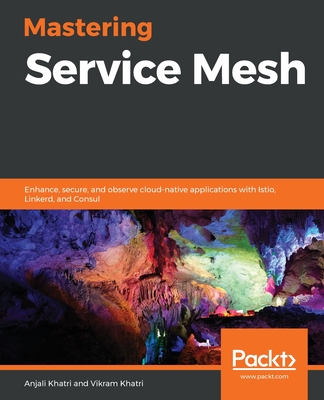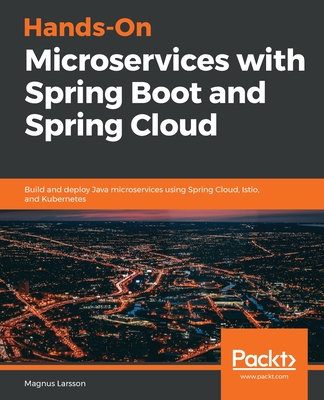Consul: Up and Running: Service Mesh for Any Runtime or Cloud
暫譯: Consul:啟動與運行:適用於任何執行環境或雲端的服務網格
Kysow, Luke
- 出版商: O'Reilly
- 出版日期: 2022-07-05
- 定價: $2,300
- 售價: 9.5 折 $2,185
- 貴賓價: 9.0 折 $2,070
- 語言: 英文
- 頁數: 260
- 裝訂: Quality Paper - also called trade paper
- ISBN: 1098106148
- ISBN-13: 9781098106140
-
相關分類:
DevOps、Kubernetes、雲端運算
立即出貨 (庫存=1)
買這商品的人也買了...
-
 無瑕的程式碼-敏捷完整篇-物件導向原則、設計模式與 C# 實踐 (Agile principles, patterns, and practices in C#)
無瑕的程式碼-敏捷完整篇-物件導向原則、設計模式與 C# 實踐 (Agile principles, patterns, and practices in C#)$790$616 -
 Working Effectively with Legacy Code : 管理、修改、重構遺留程式碼的藝術 (中文版)
Working Effectively with Legacy Code : 管理、修改、重構遺留程式碼的藝術 (中文版)$720$562 -
 $572Rust 權威指南 (The Rust Programming Language (Covers Rust 2018))
$572Rust 權威指南 (The Rust Programming Language (Covers Rust 2018)) -
 再強一點:用 Go語言完成六個大型專案 (書況較舊,不介意再下單)
再強一點:用 Go語言完成六個大型專案 (書況較舊,不介意再下單)$780$515 -
 Network Programming with Go: Learn to Code Secure and Reliable Network Services from Scratch
Network Programming with Go: Learn to Code Secure and Reliable Network Services from Scratch$1,663$1,575 -
 黑帽 Python|給駭客與滲透測試者的 Python 開發指南, 2/e (Black Hat Python : Python Programming for Hackers and Pentesters, 2/e)
黑帽 Python|給駭客與滲透測試者的 Python 開發指南, 2/e (Black Hat Python : Python Programming for Hackers and Pentesters, 2/e)$450$356 -
 Spring REST API 開發與測試指南|使用 Swagger、HATEOAS、JUnit、Mockito、PowerMock、Spring Test
Spring REST API 開發與測試指南|使用 Swagger、HATEOAS、JUnit、Mockito、PowerMock、Spring Test$580$458 -
 $1,960Kubernetes: Up and Running: Dive Into the Future of Infrastructure, 3/e (Paperback)
$1,960Kubernetes: Up and Running: Dive Into the Future of Infrastructure, 3/e (Paperback) -
 Linux 網路內功修煉 - 徹底了解底層原理及高性能架構
Linux 網路內功修煉 - 徹底了解底層原理及高性能架構$780$616 -
 演算法生存指南
演算法生存指南$800$632 -
 從 Hooks 開始,讓你的網頁 React 起來 (第二版)(iT邦幫忙鐵人賽系列書)
從 Hooks 開始,讓你的網頁 React 起來 (第二版)(iT邦幫忙鐵人賽系列書)$720$562 -
 The Rust Programming Language, 2/e (Paperback)
The Rust Programming Language, 2/e (Paperback)$1,786$1,692 -
 哎呀!原來 React 這麼有趣好玩:圈叉、貪吃蛇、記憶方塊三款經典遊戲實戰練習(iThome鐵人賽系列書)
哎呀!原來 React 這麼有趣好玩:圈叉、貪吃蛇、記憶方塊三款經典遊戲實戰練習(iThome鐵人賽系列書)$620$484 -
 Smaller C|用於小型機器之精實程式碼 (Smaller C: Lean Code for Small Machines)
Smaller C|用於小型機器之精實程式碼 (Smaller C: Lean Code for Small Machines)$680$537 -
 白話機器學習
白話機器學習$780$616 -
 React 思維進化:一次打破常見的觀念誤解,躍升專業前端開發者(iThome鐵人賽系列書)【軟精裝】
React 思維進化:一次打破常見的觀念誤解,躍升專業前端開發者(iThome鐵人賽系列書)【軟精裝】$790$616 -
 Python 風格徹底研究|超詳實、好理解的 Python 必學主題 (Dead Simple Python)
Python 風格徹底研究|超詳實、好理解的 Python 必學主題 (Dead Simple Python)$980$735 -
 遞迴演算法大師親授面試心法:Python 與 JavaScript 解題全攻略 (The Recursive Book of Recursion)
遞迴演算法大師親授面試心法:Python 與 JavaScript 解題全攻略 (The Recursive Book of Recursion)$680$510 -
 建構機器學習系統實踐指南
建構機器學習系統實踐指南$620$465 -
 機器學習的訓練資料 (Training Data for Machine Learning)
機器學習的訓練資料 (Training Data for Machine Learning)$780$616 -
 資料工程基礎|規劃和建構強大、穩健的資料系統 (Fundamentals of Data Engineering)
資料工程基礎|規劃和建構強大、穩健的資料系統 (Fundamentals of Data Engineering)$980$774 -
 讓 AI 好好說話!從頭打造 LLM (大型語言模型) 實戰秘笈
讓 AI 好好說話!從頭打造 LLM (大型語言模型) 實戰秘笈$680$537 -
 日式 RPG 編年史:從 DQ 到 FF,角色扮演遊戲敘事手法完全剖析
日式 RPG 編年史:從 DQ 到 FF,角色扮演遊戲敘事手法完全剖析$380$300 -
 軟體工程師的英語使用守則:English for Developers
軟體工程師的英語使用守則:English for Developers$420$332 -
 內行人才知道的系統設計面試指南 第二輯 (System Design Interview – An Insider's Guide: Volume 2)
內行人才知道的系統設計面試指南 第二輯 (System Design Interview – An Insider's Guide: Volume 2)$820$648
商品描述
With the advent of microservices, Kubernetes, public cloud, and hybrid computing, site reliability and DevOps engineers are facing more complexity than ever before. Service mesh is an exciting new technology that promises to help tackle this complexity. A service mesh provides you with a unified control plane to manage the networking among your applications running on these distinct platforms. This definitive guide shows you how to automate networking for simple and secure application delivery with Consul.
Author Luke Kysow, Consul engineer at HashiCorp, demonstrates how this service mesh solution provides a software-driven approach to security, observability, and traffic management. Once you learn how to implement zero-trust networking by deploying Consul on multiple platforms, you'll be able to take control of application traffic, prevent outages, view metrics, integrate with legacy systems, and more.
• Dive into the characteristics of service meshes, zero-trust networking, and traffic-shaping patterns
• Deploy Consul on Kubernetes and virtual machines
• Learn how to secure, monitor, and manage your application traffic with Consul
• Use this guide to deploy and operate applications as a system administrator, DevOps engineer, or developer
From the Preface
Consul is a fully featured service mesh from HashiCorp, the company that also created Terraform, Vault, Nomad, Packer, and Vagrant. A small operations team can leverage Consul to impact security, reliability, observability, and application delivery across their entire stack—all without requiring developers to modify their underlying microservices.
In this book, you’ll learn to install, configure, and operate Consul in order to tame complexity and take back control of your infrastructure. I’m excited for you to start on your service mesh journey with Consul—let’s dig in and get up and running!
Who Should Read This Book
If you’re a platform or operations engineer tasked with maintaining a growing microservices environment on Kubernetes or VMs, then this book is for you. If you’re a microservices developer interested in increasing reliability or experimenting with advanced deployment strategies such as blue/green and canarying, this book is also for you. Or perhaps your organization is already using Consul and you’re looking to learn how it works at a deeper level and how to utilize it better.
This book will also be helpful for security engineers and higher-level decision-makers (managers, directors, VPs of engineering, and CTOs) to provide an overview of the concepts behind a service mesh and the value it provides.
This book assumes general knowledge of microservices development and networking concepts such as load balancers. It contains instructions for installing Consul on Kubernetes or Linux VMs and assumes that you will be familiar with one of those platforms. It contains exercises that you can complete on Windows, macOS, or Linux machines.
What Is Not in This Book
This book does not cover Consul features unrelated to its service mesh functionality. For example, Consul’s key/value store and Domain Name System (DNS) service discovery are not covered. Also, this book is not a detailed production-ready operations guide to Consul. The aim is to familiarize readers with Consul’s concepts and get them “up and running” with its functionality.
Navigating This Book
The book starts with service mesh fundamentals: what a service mesh is and how it works. Next, you’ll learn what makes Consul unique, its architecture, and the specific protocols it uses. With that groundwork in place, you’ll be ready to deploy Consul onto Kubernetes or VMs and add your services into the service mesh.
You’ll then learn to use Consul to secure your systems with zero trust networking, add observability, increase reliability, and control traffic. In the final chapter, I cover advanced topics such as multi-cluster deployment.
Throughout the book, I include exercises for both Kubernetes and VMs, so you can utilize these concepts with an actual microservices application. If you wish to follow along with the exercises, I recommend you complete the chapters in order since they often rely on one another.
商品描述(中文翻譯)
隨著微服務、Kubernetes、公有雲和混合計算的興起,網站可靠性和DevOps工程師面臨的複雜性比以往任何時候都要高。服務網格是一項令人興奮的新技術,承諾幫助解決這種複雜性。服務網格為您提供了一個統一的控制平面,以管理在這些不同平台上運行的應用程序之間的網絡。這本權威指南將向您展示如何使用Consul自動化簡單且安全的應用程序交付網絡。
作者Luke Kysow,HashiCorp的Consul工程師,展示了這種服務網格解決方案如何提供一種以軟件驅動的安全性、可觀察性和流量管理的方法。一旦您學會如何通過在多個平台上部署Consul來實現零信任網絡,您將能夠控制應用程序流量、防止故障、查看指標、與舊系統集成等。
• 深入了解服務網格、零信任網絡和流量塑形模式
• 在Kubernetes和虛擬機上部署Consul
• 學習如何使用Consul保護、監控和管理您的應用程序流量
• 使用本指南作為系統管理員、DevOps工程師或開發人員來部署和操作應用程序
**前言摘錄**
Consul是HashiCorp提供的全功能服務網格,該公司還創建了Terraform、Vault、Nomad、Packer和Vagrant。一個小型運營團隊可以利用Consul來影響整個技術堆棧的安全性、可靠性、可觀察性和應用程序交付——所有這些都不需要開發人員修改其底層的微服務。
在這本書中,您將學習如何安裝、配置和操作Consul,以駕馭複雜性並重新掌控您的基礎設施。我很高興您能開始使用Consul進行服務網格之旅——讓我們深入了解並開始運行吧!
**誰應該閱讀這本書**
如果您是一名平台或運營工程師,負責維護在Kubernetes或虛擬機上增長的微服務環境,那麼這本書適合您。如果您是一名微服務開發人員,對提高可靠性或實驗藍綠部署和金絲雀部署等高級部署策略感興趣,這本書也適合您。或者,也許您的組織已經在使用Consul,您希望深入了解其運作方式以及如何更好地利用它。
這本書對於安全工程師和高層決策者(經理、總監、工程副總裁和CTO)也將有所幫助,提供服務網格背後概念的概述及其所提供的價值。
這本書假設讀者對微服務開發和網絡概念(如負載均衡器)有一般了解。它包含在Kubernetes或Linux虛擬機上安裝Consul的指導,並假設您將熟悉其中一個平台。它還包含可以在Windows、macOS或Linux機器上完成的練習。
**本書不包含的內容**
本書不涵蓋與其服務網格功能無關的Consul特性。例如,Consul的鍵/值存儲和域名系統(DNS)服務發現不在涵蓋範圍內。此外,本書也不是Consul的詳細生產就緒操作指南。目的是讓讀者熟悉Consul的概念,並使他們能夠“啟動並運行”其功能。
**如何使用本書**
本書從服務網格的基本原理開始:什麼是服務網格以及它是如何工作的。接下來,您將學習使Consul獨特的特性、其架構以及它使用的特定協議。在這些基礎知識建立之後,您將準備好將Consul部署到Kubernetes或虛擬機上,並將您的服務添加到服務網格中。
然後,您將學習如何使用Consul以零信任網絡保護您的系統、增加可觀察性、提高可靠性和控制流量。在最後一章中,我將涵蓋多集群部署等高級主題。
在整本書中,我包含了針對Kubernetes和虛擬機的練習,因此您可以利用這些概念來實際的微服務應用程序。如果您希望跟隨練習,我建議您按順序完成章節,因為它們通常相互依賴。



















